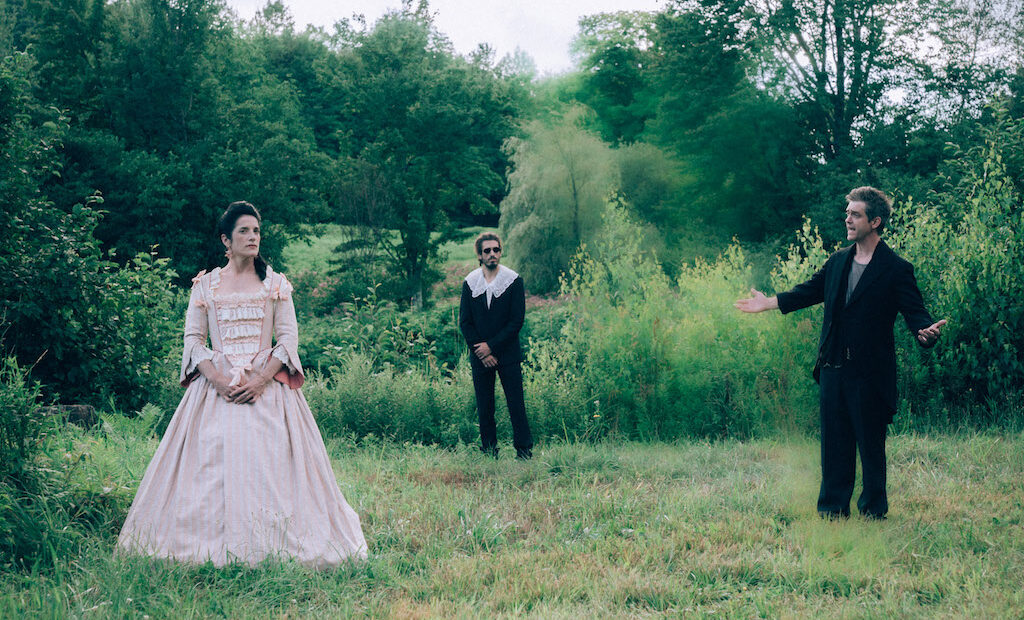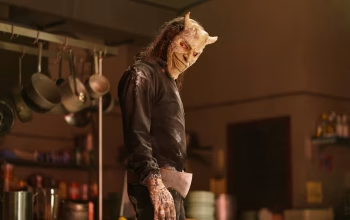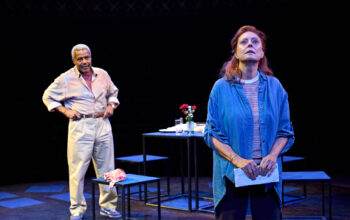Social Hygiene (Hygiène sociale)

Antonin (Maxim Gaudette) is nothing but a common and disreputable thief and writer-director Denis Côté has him fixed in his sights. In fact, most cinematic elements are held in place throughout Social Hygiene, a brisk and chirpy dramatic experiment. Côté offers a series of conversations, each of which takes place at a secure distance apart, between Antonin and five consecutive and variously wronged women. To cite an anxious influence, it’s reminiscent of Beckett’s theatrical work. To acknowledge the present conditions, it’s a none-too-subtle rearticulation of the Covid pandemic. The blatant anachronisms, stilted character address and crude exchanges together produce a sort of high-functioning artlessness.
To give a better sense of proceedings: at the opening, a woman in white and a man in black stand remotely in a field. It’s a bucolic idyll and both are in period clothes. The static shot is tarnished with a slight blurring, as grass backs onto a forest, which in turn backs onto undulant hills and a heavy skyline, apprehended in cumulus splendour. The pair are caught in overwrought comic discussion about their lives and relative follies. We learn the gist: Solveig (Larissa Corriveau) is accosting her brother, who thinks of himself as a bit of a vagabond or dandy. This and the subsequent tableaux, all of which feature a trickle of witness statements, accumulate to form the protagonist’s trial and reckoning.
The rest of Antonin’s accusatory human rollcall is as follows: his wife, Eglantine (Évelyne Rompré), who dismisses his excuses and admits her own affair; his desirable love interest, Cassiopée (Ève Duranceau), who tries to instigate a fight between him and another suitor; a tax inspector (Kathleen Fortin), adorned in glaring roseate hues, who demands her due payment; and a young girl, Aurore (Éléonore Loiselle), who asks why he’s stolen her boyfriend’s jacket. In Aurore’s pursuit of the man, during which she scours the wooded landscape, Côté offers a glimpse of conventional documentary stylings: choice shots of twig fires and horizontal rushes of passing trees, which constitute the shifts from motionless posturing to rare visual kinesis.
The dogged and bland insistence of the dialogue draws the viewer to the film’s form rather than its content. Incongruous costumes and unbending pastoral surrounds reveal the vacuity of traditional dramaturgy, because the audience needs only the fundamental text and a scintilla of private imagination to comprehend the depicted events. Côté’s persistent use of middle distance refuses intimacy. Instead, it heightens the details which are included: be it the assertion that “men are like mushrooms”, or the revelatory set of portraits that come near the close, accompanied with a wry sonic cue that suggests benefits to proximity: “kiss me until my lips fall off.” Overall, this is a playful and confounding work.
Joseph Owen
Social Hygiene (Hygiène sociale) does not have a UK release date yet.
Read more reviews from our Berlin Film Festival 2021 coverage here.
For further information about the event visit the Berlin Film Festival website here.
Watch the trailer for Social Hygiene (Hygiène sociale) here:

























Facebook
Twitter
Instagram
YouTube
RSS